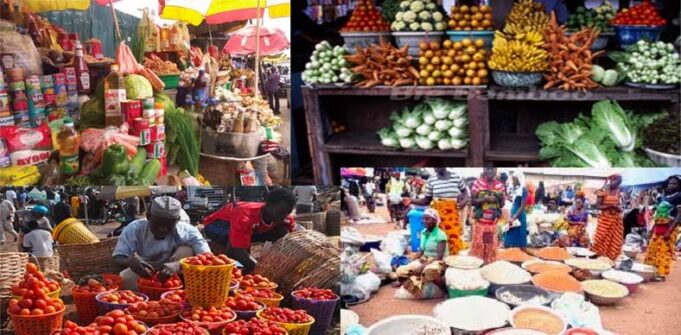Families in Nigeria are passing through difficult times as the cost of staple food is increasingly becoming unbearable.
Findings at various markets across the country show that prices of rice, beans, garri, flour and sugar, among others, are rising almost on a weekly basis.
While breadwinners are seeking government’s help; traders are lamenting that the inflation rate is fast eroding their capital base.

The latest inflation figure was 24.08 per cent in July 2023, the highest since September 2005.
Kogi, Lagos, Bayelsa pay more for food as inflation hits 24.08%
After Tinubu, CBN governor’s meeting, dollar crashes to N790 at parallel market
A March report by the Food and Agricultural Organisation (FAO) showed that nearly 25 million Nigerians were at risk of hunger between June and August unless urgent actions are taken.
 Advertorial
Advertorial
FAO identified continued conflict, climate change, inflation and rising food prices as key drivers of the trend.
It said, “Of the 17 million people who are currently food insecure, 3 million are in the north-east Borno, Adamawa and Yobe states.
“Without immediate action, this figure is expected to increase to 4.4 million in the lean season. This includes highly vulnerable displaced populations and returnees who are already struggling to survive a large-scale humanitarian crisis in which 8.3 million people need assistance.”

Our report indicates that food prices for a period of six-month (February-July 2023) have hit rooftops.
Available records showed that by mid-February to the end of July, prices of maize, beans and rice from three-grain markets of Dawanau, Dandume and Kumo in Kano, Katsina and Gombe states as well as Abuja had on average doubled, especially maize; while beans and rice added N10,000 and N20,000 respectively.
According to the prices index, the prices of the items kept soaring unabated almost every week to the current staggering level.

As of July 29, 100kg of maize sold for N41,000; 100kg of beans, N46,000; and 100kg of rice, N77,000.
But checks last week and this week at a famous maize market in Dandume, Katsina State, showed that the price of 100kg of maize had risen to N52,000 per 100kg.
A grain buyer and seller at the market, Ya’u Dauda, told our correspondent that at Funtua and Giwa markets that the prices of the commodity were also on the rise as 100kg bag sold for N53,000 at Funtua and N52, 000 at Giwa.

There are similar reports at the weekend at Dawanau market where the price had risen to about N50,000 per 100kg.
Curiously, in February, these grains sold for N19,000, N38,000 and N59,000, respectively.
Spaghetti;
In February, crown spaghetti sold for N5,000, but hit N5,500 in March; N5, 550 in April and N5,700 in May.
Sugar;
The price of Dangote sugar in February was N29,000; N32,000 in March; N32, 300 in April; N37, 800 in July and N42,200 at present.

Flour;
The price of Golden Penny flour was N27,000 in February; N28,300 in March; N28,500 in April; N28,500 in June and N31,200 at present.
‘Toughest time in our lifetime’
Abdulrahman Lawal, a trader and father of many children in Zaria, who called for intervention through a price regulatory agency, said he now focused on essential demands only.
He said: “Food has become a sacred commodity now. I’m no longer concerned about children’s school fees. If we get one meal a day for the family, we just thank God.

“In my house now, we boil sweet potatoes because it doesn’t require any ingredients to cook. Maize is out of my reach and poor families, let alone rice and beans.
“Government should intervene and put price control on essential commodities, the same way they regulated the fuel market before removing the subsidy; that is the alternative.’’

Another trader and artisan, Malam Murtala Abdulrazaq, said: “N5,000 could hardly sustain me a day because even a mudu of rice is more than N2,000; while sometime ago, I could sustain my life at N1,500 in a day. I cannot afford to buy maize flour now. Instead, I buy garri to prepare eba, which is more affordable because it’s less expensive. Getting three square meals is no longer feasible.”
A resident of Abuja, Azeez Ramat Kikelomo, said a 100kg bag of beans, which sold for N39,000 in February, ws now N80,000.

She said in February, maize, which sold for N19,000 at Bwari market now sold for N45,000.
Kikelomo, a civil servant, pleaded with the government at all levels to find the solution to the continued rise in the prices of foodstuffs.
Situations in S/West, S/East, S/South
Food items like local rice, garri, yam, tomato, bread, plantain, vegetables, fish, beans and others have recorded more than 25 per cent increase between February and July in the South.

Mrs Ibiyemi O, a rice seller at Bodija market, Ibadan, said a bag of rice, which sold for between N27,000 and N28,000 in February, was now N45,000 and above. A bag of beans, which sold for N37,000 in February, is now N47,000.
A medium-sized tuber of yam, hitherto sold in the range of N700-N800 now costs between N1,200 and N1,500.
In Lagos, a loaf of bread, which sold for N600 in January, is now between N800 and N1,000.
The price of a crate of eggs has also risen from N1, 200 to N2, 500 for the big size; and the small size, N2, 200.

At Sunday market in Ogba, a paint bucket of garri has hit N2,000 from N800 earlier in the year.
In Abakaliki, a medium paint of beans now costs between N2, 500 and N2, 700 from N1, 600-N1, 800 depending on the species.
A trader, Chigozie Ogbonna, blamed the high cost of foodstuffs on activities of the task force on major highways in the zone.

“If you travel along the Abakaliki-Ikom Road, you’ll see the task force checking and collecting money from vehicles transporting food items. This also contributes to the high cost of food items.”
In Uyo, a cup of rice sold for between N200 and N250 depending on the type as against the N150 and N180 earlier in the year.

















